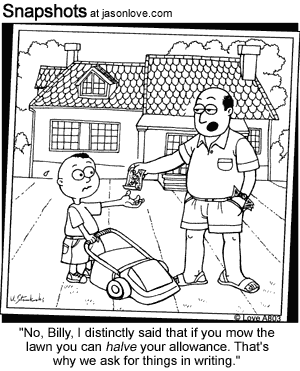Do I need written contracts?
 Chances are that you've heard of some halcyon past where all business was conducted on a handshake and a smile. Want the truth? Never happened.
In 1677, and well before your grandparents developed a rose-tint to their recollections, England enacted a law that was the first iteration of what became known as the "Statute of Frauds." The explicit purpose of the law was to prevent "he-said, she-said" scenarios where the opposing parties had conveniently different interpretations regarding verbal contracts.
Chances are that you've heard of some halcyon past where all business was conducted on a handshake and a smile. Want the truth? Never happened.
In 1677, and well before your grandparents developed a rose-tint to their recollections, England enacted a law that was the first iteration of what became known as the "Statute of Frauds." The explicit purpose of the law was to prevent "he-said, she-said" scenarios where the opposing parties had conveniently different interpretations regarding verbal contracts.
Fast forward a few centuries or so, and every state in the U.S. has passed the statute of frauds, in one form or another. The way these laws are written, verbal contracts regarding these issues are void by law, meaning they have no legal enforceability whatsoever.
Which of these topics need to have written contracts?
Marriage
If the honeymoon period doesn't survive long enough to reach the honeymoon itself, you can't make your errant partner marry you unless you have it in writing. Less common in modern times, marriage contracts used to be very common and are still common in some cultures. However embarrassing it might seem, few today can imagine being required to marry someone they don't love, but it's perfectly legal, as long as it is in writing.
One Year
If a contract cannot be performed within a year, it has to be in writing. This unique wording makes this a favorite question to be asked on the bar exam. In other words, if it is at all possible that the contract could be performed within a year, it does not have to be in writing. It doesn't matter if it's insanely unlikely, as long as it's possible, you're good to rely on a handshake, at least as far as the law is concerned. Therefore, you could agree, verbally, to be contractually obligated to do something for the rest of your life, and it would be completely enforceable because it's possible that you keel over within the next 12 calendar months.
Land
If you want to do anything with land: buy it, sell it, borrow against it, claim an easement over it, or rent it (except for a very short period of time), you've got to have it in writing. Otherwise, you get nothing.
Executors
When executors act on the half of an estate, they execute documents for the estate, and not them selves. If the executor is ever going to be personally liable, that assumption has to be recorded in some type of writing.
Goods Over $500
The most significant change to the statute of fraud's over the last 200 years has been the introduction of the Uniform Commercial Code (UCC). The biggest change that the you CC makes to the statute of fraud is including a provision that the sale of goods over $500 must be in writing. It's very important to recognize that this only covers goods, and not services.
Someone Else's Debts
If you ever agree to be personally responsible for someone else's debt (ps-don't do that), that agreement needs to be in writing. This protects people that, in a moment of weakness, might let slip that they will pay personally if their business cannot cover its debts.
Modern Changes
While these topics are typically the ones that must be in writing, most states have added a few other areas in which contracts need to be written and nonverbal. For example, noncompetition agreements now are valid in Alabama as of January 1, 2016, But they must be in writing. Depending on the state, there may be other contracts that may be required to be in writing, but these are generally the topics that are at issue.
Should My Contract be in Writing?
Yeah, probably. I'm never surprised at how differently two parties can interpret the same contract, even when it is in writing. Remember, when your contact issue reaches trial, it will be months, maybe even years after you spoke, so how likely is it that you will remember every detail flawlessly? You won't. When in doubt, get it in writing.
If you need advice on what contracts should be in writing, or what provisions that should be included in contracts, The Watson Firm can help. Simply give us a call at 205.545.7278 or complete the contact form on this page.
